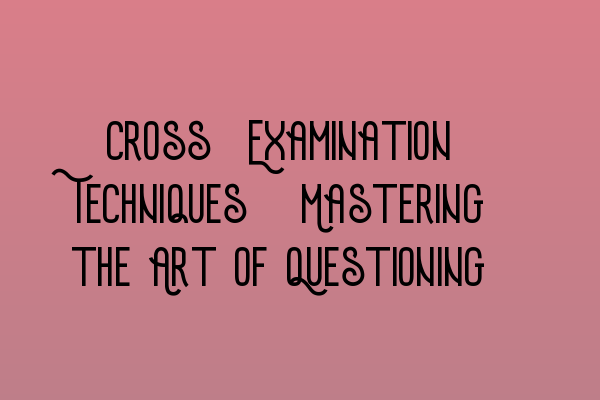Cross-Examination Techniques: Mastering the Art of Questioning
Welcome to another informative blog post brought to you by SQE Criminal Law & Practice Law UK! Today, we will delve into the fascinating world of cross-examination techniques, aiming to provide valuable insights on mastering the art of questioning. Effective cross-examination is a skill that every criminal law practitioner must possess, as it plays a pivotal role in presenting a strong case for your clients.
Before we delve into the various techniques, let’s briefly discuss what cross-examination entails. Cross-examination is the process of questioning a witness who has already testified for the opposing party. Its purpose is to challenge the witness’s credibility, clarify any inconsistencies in their testimony, and present alternative narratives that favor your client’s case.
The Importance of Preparation
Preparation is the key to success when it comes to cross-examination. As a solicitor, you must thoroughly review the witness’s statements, depositions, and other relevant evidence before entering the courtroom. By familiarizing yourself with the case, you can craft effective questions that target the weaknesses in the witness’s testimony.
At SQE Criminal Law & Practice Law UK, we offer comprehensive SQE 1 preparation courses that equip aspiring solicitors with the necessary skills and knowledge to excel in their careers. Our courses cover a wide range of topics, including cross-examination techniques, evidence gathering, and courtroom etiquette.
Analyze the Witness’s Testimony
When cross-examining a witness, it is crucial to carefully analyze their testimony. Pay attention to any inconsistencies, contradictions, or gaps in their statements. By identifying these weaknesses, you can create a strong line of questioning that exposes the flaws in their narrative.
Our SQE 1 practice mocks FLK1 FLK2 provide invaluable opportunities to practice analyzing witness testimony. These practice exams simulate real-life scenarios, allowing you to refine your skills and build confidence in your cross-examination techniques.
Developing Effective Questions
The art of questioning lies in the ability to ask concise, impactful questions. Avoid asking open-ended questions that allow the witness to provide lengthy explanations, as this can dilute the impact of your cross-examination. Instead, focus on asking leading questions that elicit specific responses.
For instance, instead of asking, “What happened on the night of the incident?”, consider asking, “Isn’t it true that you were present at the scene when the alleged crime took place?”. By framing your questions in a suggestive manner, you guide the witness towards the desired response, highlighting inconsistencies or contradictions in their testimony.
Pro Tip: To further enhance your questioning skills, consider taking part in SQE 1 practice exam questions offered by SQE Criminal Law & Practice Law UK. These quizzes provide an interactive learning experience while helping you identify areas for improvement.
Building Rapport with the Witness
While cross-examining a witness, it is essential to build rapport and establish credibility. A warm and courteous approach can create a more favorable environment for questioning. By treating the witness with respect, you increase the likelihood of receiving honest and favorable responses.
Remember: Effective cross-examination is not about intimidating or badgering the witness. It is a strategic process aimed at revealing the truth and presenting the strongest case for your client.
Applying the Techniques in the Courtroom
Once you have mastered the cross-examination techniques, it’s time to put them into practice in the courtroom. Remember to maintain a confident and composed demeanor while questioning the witness. Stay focused and adapt your line of questioning based on the witness’s responses.
At SQE Criminal Law & Practice Law UK, we offer SQE 2 preparation courses that provide comprehensive guidance on courtroom advocacy. Our courses cover practical exercises and simulations, allowing you to refine your skills under expert supervision.
Conclusion
Mastering the art of questioning through effective cross-examination techniques is a crucial skill for criminal law practitioners. By investing in your professional development and honing your skills, you can present compelling arguments and secure favorable outcomes for your clients.
At SQE Criminal Law & Practice Law UK, we are committed to supporting aspiring solicitors on their journey to success. Whether you are preparing for SRA SQE exam dates or seeking comprehensive preparation courses, we have the resources and expertise to help you excel in your legal career.
